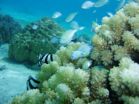Better air quality indicators are needed for the world's cities
2012-08-29
(Press-News.org) In their August editorial, the PLOS Medicine Editors reflect on a recent Policy Forum article by Jason Corburn and Alison Cohen*, which describes the need for urban health equity indicators to guide public health policy in cities and urban areas. The Editors focus on the need for better air quality data for the world's cities because many cities with the worst airborne particulate levels are in low- and middle-income countries and often have limited data. Worryingly, the World Health Organization estimates that 1.34 million premature deaths were at attributable to outdoor air pollution in 2008.
The Editors note that, "for [air quality] indicators to be effective they must be context-specific and relevant, and be made available transparently so that they can be open to interpretation and re-evaluation."
INFORMATION:
*Corburn J, Cohen AK (2012) Why We Need Urban Health Equity Indicators: Integrating Science, Policy, and Community. PLoS Med 9(8): e1001285. doi:10.1371/journal.pmed.1001285
http://www.plosmedicine.org/article/info%3Adoi%2F10.1371%2Fjournal.pmed.1001285
Funding: The authors are each paid a salary by the Public Library of Science, and they wrote this editorial during their salaried time.
Competing Interests: The authors' individual competing interests are at http://www.plosmedicine.org/static/editorsInterests.action. PLOS is funded partly through manuscript publication charges, but the PLOS Medicine Editors are paid a fixed salary (their salary is not linked to the number of papers published in the journal).
Citation: The PLOS Medicine Editors (2012) The Air That We Breathe: Addressing the Risks of Global Urbanization on Health. PLoS Med 9(8): e1001301. doi:10.1371/journal.pmed.1001301
IN YOUR COVERAGE PLEASE USE THIS URL TO PROVIDE ACCESS TO THE FREELY AVAILABLE PAPER (THIS LINK WILL BECOME LIVE WHEN THE EMBARGO LIFTS):
http://www.plosmedicine.org/article/info%3Adoi%2F10.1371%2Fjournal.pmed.1001301
CONTACT:
The PLOS Medicine Editors
PLOS Medicine
medicine_editors@plos.org
END
ELSE PRESS RELEASES FROM THIS DATE:
2012-08-29
Child mortality is a key indicator not only of child health and nutrition but also of the implementation of child survival interventions and, more broadly, of social and economic development. Millennium Development Goal 4 calls for a two thirds reduction in the under-five mortality rate between 1990 and 2015. With the renewed focus on child survival, tracking of progress in the reduction of child mortality is increasingly important. A sponsored collection of new articles on the methodology for estimation of child mortality was published today in the open-access journal ...
2012-08-29
Researchers at the University of Hawaii – Manoa (UHM) School of Ocean and Earth Science and Technology (SOEST) made a discovery that challenges a major theory in the field of coral reef ecology. The general assumption has been that the more flexible corals are, regarding which species of single celled algae (Symbiodinium) they host in coral tissues, the greater ability corals will have to survive environmental stress. In their paper published August 29, 2012, however, scientists at the Hawaii Institute of Marine Biology (HIMB) at SOEST and colleagues documented that the ...
2012-08-29
Scientists have taken a step closer to solving one of life's mysteries – why family size generally falls as societies become richer.
Evolutionary biologists have long puzzled over this because natural selection is expected to have selected for organisms that try to maximise their reproduction. But in industrialised societies around the world, increasing wealth coincides with people deliberately limiting their family size – the so-called 'demographic transition'.
In a study published in Proceedings of the Royal Society B: Biological Sciences, researchers from the London ...
2012-08-29
Astronomers at the International Astronomical Union meeting announced the discovery of the first transiting circumbinary multi-planet system: two planets orbiting around a pair of stars. The discovery shows that planetary systems can form and survive even in the chaotic environment around a binary star. And such planets can exist in the habitable zone of their stars. "Each planet transits over the primary star, giving unambiguous evidence that the planets are real," said Jerome Orosz, Associate Professor of Astronomy at San Diego State University and lead author of the ...
2012-08-29
Fort Davis, Texas — NASA's Kepler mission has found the first multi-planet solar system orbiting a binary star, characterized in large part by University of Texas at Austin astronomers using two telescopes at the university's McDonald Observatory in West Texas. The finding, which proves that whole planetary systems can form in a disk around a binary star, is published in the August 28 issue of the journal Science.
"It's Tatooine, right?" said McDonald Observatory astronomer Michael Endl. "But this was not shown in Star Wars," he said, referring to the periodic changes ...
2012-08-29
There are more than 400,000 species of beetles and only two species of the tuatara, a reptile cousin of snakes and lizards that lives in New Zealand. Crocodiles and alligators, while nearly 250 million years old, have diversified into only 23 species. Why evolution has produced "winners" — including mammals and many species of birds and fish — and "losers" is a major question in evolutionary biology.
Scientists have often posited that because some animal and plant lineages are much older than others, they have had more time to produce new species (the dearth of crocodiles ...
2012-08-29
Gravitational waves, much like the recently discovered Higgs boson, are notoriously difficult to observe. Scientists first detected these ripples in the fabric of space-time indirectly, using radio signals from a pulsar-neutron star binary system. The find, which required exquisitely accurate timing of the radio signals, garnered its discoverers a Nobel Prize. Now a team of astronomers has detected the same effect at optical wavelengths, in light from a pair of eclipsing white dwarf stars.
"This result marks one of the cleanest and strongest detections of the effect of ...
2012-08-29
VIDEO:
An animation of satellite observations from August 26-28, 2012 shows Tropical Storm Isaac moving past the Florida Keys and into the Gulf of Mexico, nearing landfall in the U.S. Gulf...
Click here for more information.
NASA satellites have been providing valuable data to forecasters at the National Hurricane Center watching the development and progression of powerful Tropical Storm Isaac as it heads for landfall.
The Moderate Resolution Imaging Spectroradiometer ...
2012-08-29
Eyewitness identification evidence is often persuasive in the courtroom and yet current eyewitness identification tests often fail to pick the culprit. Even worse, these tests sometimes result in wrongfully accusing innocent suspects. Now psychological scientists are proposing a radical alternative to the traditional police lineup that focuses on eyewitnesses' confidence judgments.
In a new article forthcoming in Psychological Science, a journal of the Association for Psychological Science, Neil Brewer of Flinders University and colleagues report a new type of lineup ...
2012-08-29
Tampa, FL (Aug. 28, 2012) -- A new study has found a gene that appears to make women happy, but it doesn't work for men. The finding may help explain why women are often happier than men, the research team said.
Scientists at the University of South Florida (USF), the National Institutes of Health (NIH), Columbia University and the New York State Psychiatric Institute reported that the low activity form of the gene monoamine oxidase A (MAOA) is associated with higher self-reported happiness in women. No such association was found in men.
The findings appear online ...
LAST 30 PRESS RELEASES:
[Press-News.org] Better air quality indicators are needed for the world's cities




